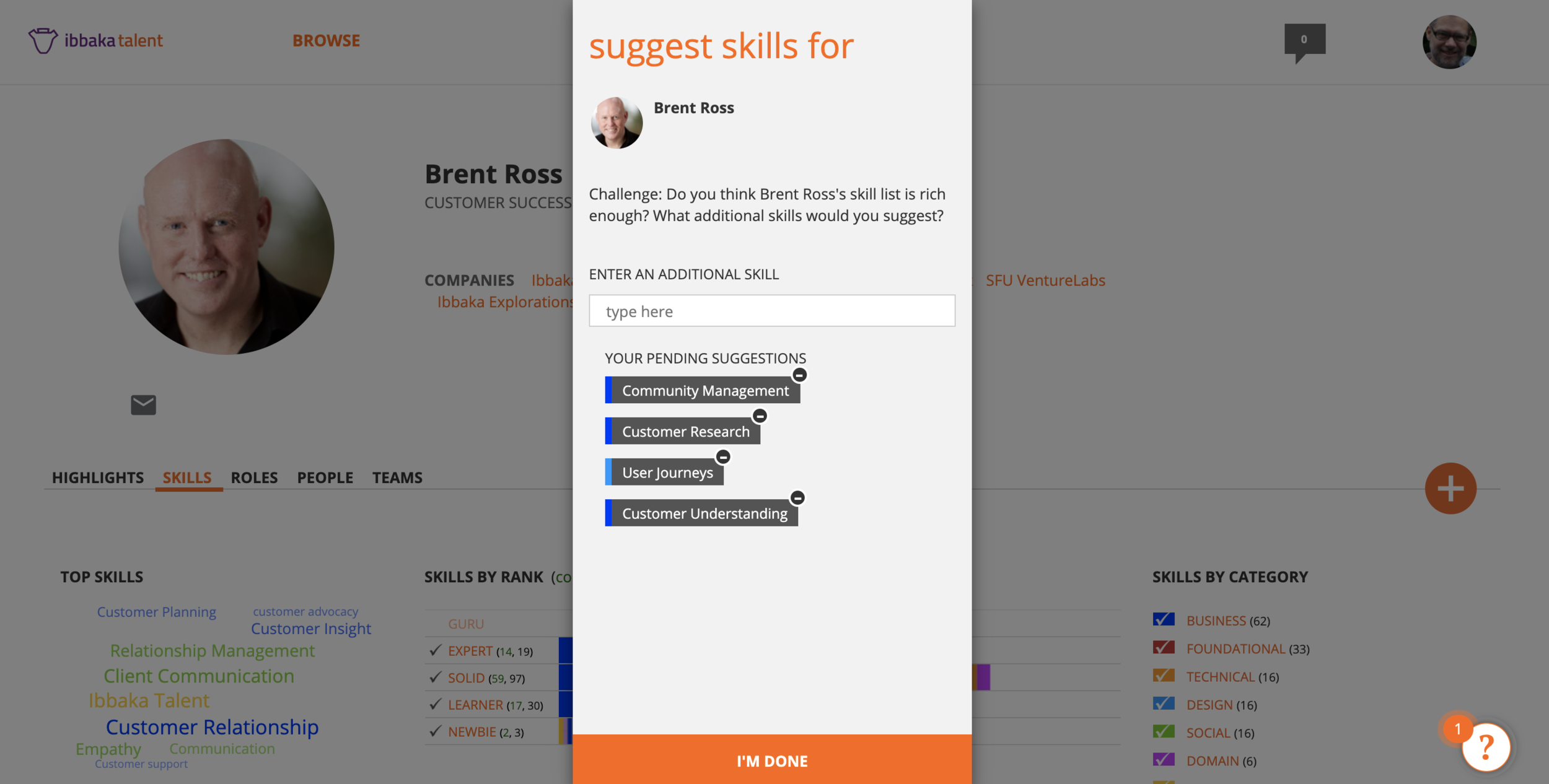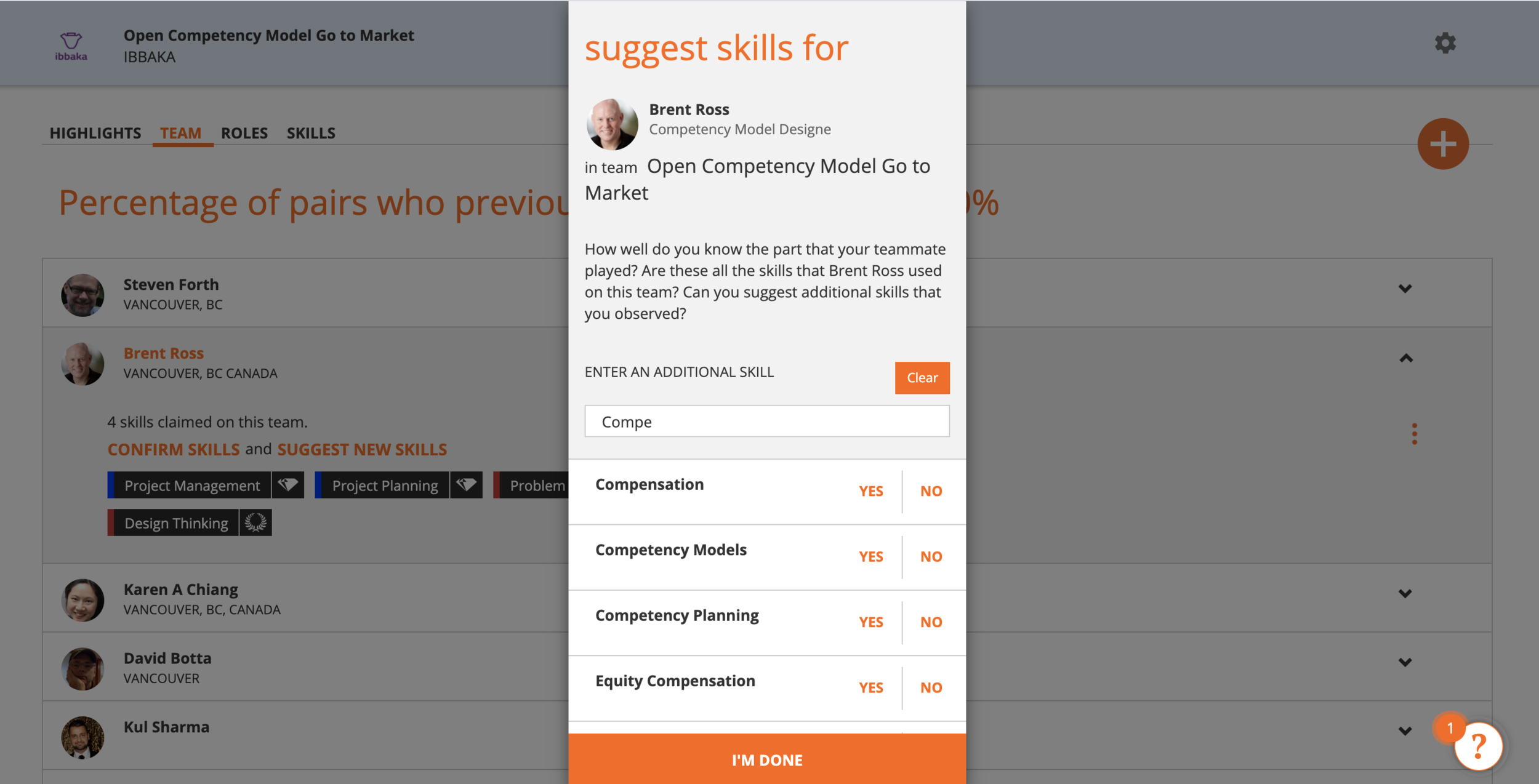Sharing skills is at the center of the Ibbaka approach
Steven Forth is co-founder and managing partner at Ibbaka. See his skill profile here.
Who best understands your skills?
Is it you? Your manager? Your coach? The people you work with?
Most of us have only a vague understanding of our own skills. We do not take the time to reflect on our performance, its constituent parts, and how to improve. Learning how to reflect on our own skills, recognize them, develop them and connect them is part of work for most of us today. It is central to having a successful career.
Some managers are very observant of their team’s skills. These people can be great managers. It is part of a manager’s job to recognize potential and help to develop it. One way to do this is by suggesting skills to the people on their team. I high performance organizations this is something that is expected.
The people with the deepest insight into our skills, and weaknesses, are most often the people we work with.
Please take five minutes and think about someone you work with closely. Make notes on the following questions. Then share your answers with them and ask them to reciprocate.
What are their core skills, the ones they use everyday in their work with you?
What skills make them unique?
What skills make them easy to work with?
What is a potential skill, that they could develop based on their current skills?
Your colleagues and teammates often have the most insight into your skills. This is coded into the Ibbaka Talent Platform which offers many opportunities to suggest skills.
Three reasons to suggest skills
There are three main reasons to suggest skills to other people.
They need the skill (or the organization needs them to have the skill)
They already have the skill (and may not recognize it)
They have the potential to develop the skill
They need the skill
The obvious time to suggest a skill to a colleague is when they need the skill for work you are doing together. An example at Ibbaka is Service Design. Now service design is much more than a simple skill. Like design thinking, or software engineering it is a composite skill and a discipline, multi faceted, and with many applications.
What is Service Design?
Service design is a process where designers create sustainable solutions and optimal experiences for both customers in unique contexts and any service providers involved. Designers break services into sections and adapt fine-tuned solutions to suit all users’ needs in context—based on actors, location and other factors.
We are rethinking how we deliver value through the lens of service design, so this skill (and its component skills) are showing up more in more in our teams and roles. We have bee suggesting service design and its associated skills to each other both directly and in the context of specific projects.
They already have the skill
Most of us have skills we have not yet claimed, either because we are not aware of them or are not aware of their relevance to the work we do.
One of the best gifts one can give is to suggest a skill to a person. This serves as a way to celebrate a person for the skills they have and to recognize their accomplishments. One of the design rules for the Ibbaka Platform is that nothing shows up on your platform without your accepting it, so people can suggest skills to you but other people will not see them until you accept them.
If you want to develop a skill-based culture one of the first steps is to suggest skills to your colleagues.
They have the potential to develop the skill
In today’s world we all need to develop new skills. There are new challenges all around us ad we need new skills to address them. We all have potential skills, skills that we could develop with a little effort. These potential skills generally come from new ways to combine our existing skills (skills come alive through their connections to other skills) or from extending our expertise in skills we already have. Let’s look at a recent example.
Artificial Intelligence (AI), specifically of the Deep Learning variety, has become critical to many organizations over the past few years and AI experts are in high demand. What skills does one need to get up to speed with AI? On a technical level the most important are …
Statistics
Probability (especially Bayesian)
Programming (R or Python being the most useful)
Data modeling (the most difficult part of AI development is coming up with the right data model)
If you have all four of these skills you can rapidly become an AI engineer.
Some smart people will challenge this and say that without an appreciation for human diversity and the ethical implications of AI services one should refrain from entering the space. There is a lot of truth to that and any competency model for AI should address this.
Suggesting Skills on the Ibbaka Talent Platform
The Ibbaka Talent Platform has three main ways to suggest skills. One can do this directly,
This is the simplest and most direct approach. Just go to the Skills tab on a person’s profile and hit the Plus button.
One can also suggest skills in the context of a team you are working on together.
Go to a team, pick a person, and suggest skills to them.
This can be compelling as the suggestion is specific to actual work you are doing together. Once accepted, the skill is recorded in the Ibbaka skill graph and adds intelligence to the graph. Skills are most meaningful in the context of the work they are used for and who they are used with.
One can also suggest skills indirectly, by suggesting a Job or a Role to a person. Jobs and Roles are defined in competency models and have skills attached. Roles are also available for teams. So by suggesting a role one is also suggesting skills.
This also puts skill suggestions in the context of work. Jobs are composed of roles and we also play roles on teams or have ad-hoc roles (I am doing this off the side of my desk). All that information enriches the skill graph.





